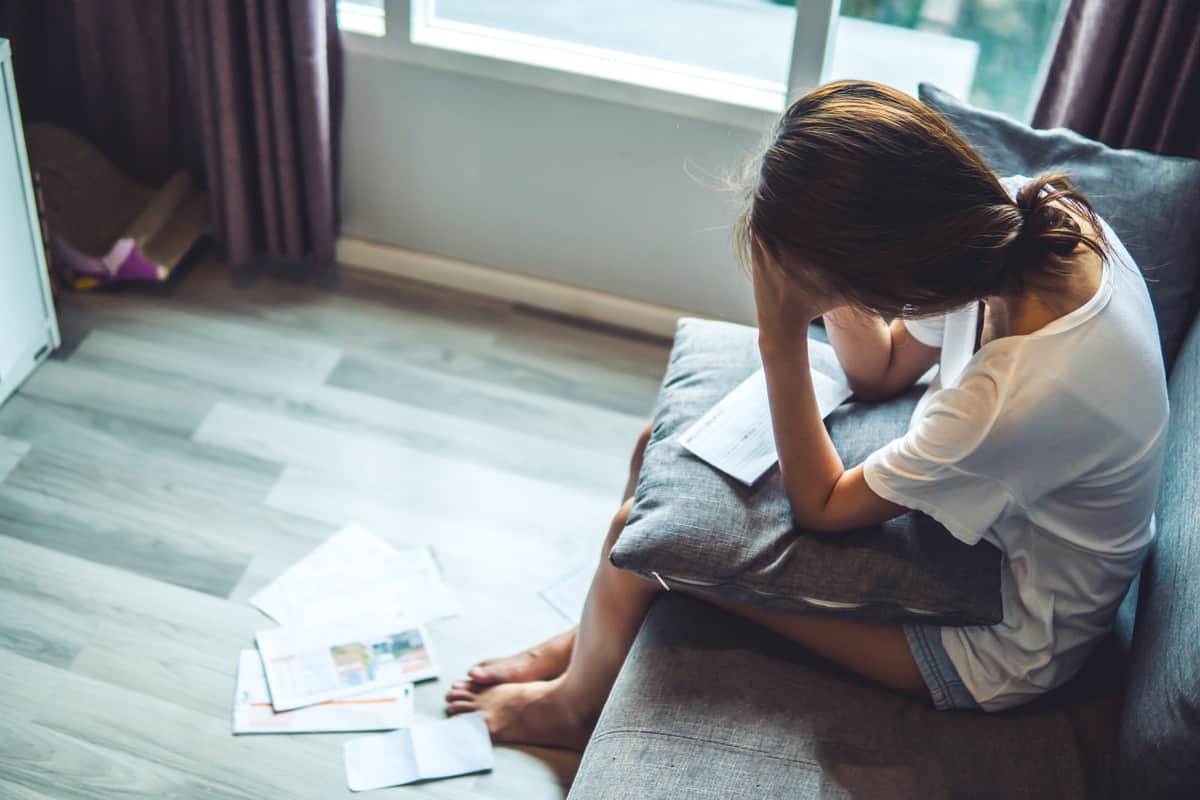The coronavirus pandemic has done more than cause people to go into lockdown — it’s led to job loss across the country.
As of March 2020, nearly one in five households experienced a layoff or reduction in work hours due to the virus, according to NPR. And by April 4, 2020, the Department of Labor reported 6,606,000 unemployment claims had been filed.
What makes this especially troubling is that many Americans live paycheck to paycheck. The American Payroll Association reported in 2019 that more than 74% of employees would face financial difficulties if their paycheck was delayed by one week.
If you’re in this situation and worried about not being able to pay your rent, here are some resources to look into:
- Talk to your landlord ASAP
- Take advantage of the CARES Act
- Apply for aid from Modest Needs
- Call, email, or text United Way and 211
- Call the Veterans Affairs Medical Center
- Contact your local legal aid organization
6 Ways To Get Help Paying Rent
If you’re struggling to pay your rent, there are several options that could help. From new government regulations to nonprofit organizations that offer funding, here are six ways to find rent assistance.
Talk to your landlord ASAP
Some apartment communities and landlords might offer rent extensions to good tenants who have never missed a payment before. This can be the case whether you lost your job or had some other financial hardship as a result of the pandemic or for other reasons. If you’re proactive and communicate the problem early on and can give them a timeline of when you expect to be able to pay, they might be willing to work with you.
What to do next: Call or email your landlord ASAP and ask for a payment extension or arrange for partial payments. Be prepared to show proof of a loss of income, like a letter from your employer or paystubs showing lower pay. And consider creating a payment plan to get back on track.
Take advantage of the CARES Act
On March 27, 2020, President Donald Trump signed the Coronavirus Aid, Relief, and Economic Security (CARES) Act into law to provide economic relief to people affected by the coronavirus outbreak.
Under the CARES Act, certain landlords can’t evict their tenants for 120 days following the enactment of the law. Once the 120 days expires (July 25, 2020), the landlord has to give you 30 days’ notice to vacate the property.
During the 120-day moratorium on eviction, the landlord cannot charge you any fees or penalties related to the nonpayment of rent. The moratorium on eviction doesn’t mean you don’t have to pay rent or that you get three months rent-free — it simply means your landlord can’t evict you during this period.
And not all landlords have to follow the CARES Act regulations. It only applies to rental housing financed with federally-backed mortgages, such as a Federal Housing Administration (FHA) loan or loans held or secured by Fannie Mae or Freddie Mac. It also applies to housing that’s covered by the Violence Against Women Act of 1994 and the rural housing voucher program under the Housing Act of 1949.
What to do next: If you can’t afford your rent payment, contact your landlord right away to explain the circumstances and ask if you can get a payment extension. If your landlord’s building falls under the covered housing mentioned in the CARES Act, share the text of the CARES Act with them to show that they cannot legally evict you during the moratorium.
Apply for aid from Modest Needs
Modest Needs, a New York-based nonprofit organization, provides emergency grants to workers nationwide who need emergency assistance, usually for rent, utilities, or medical bills.
“Many people had financial issues long before the coronavirus came along,” says Dr. Keith Taylor, Modest Needs’ president. “This is just the latest thing to hit them hard. Many low-income workers are on the edge; they’re doing everything they can just to stay afloat.”
According to the website, the organization recently received four grants to help individuals affected by the COVID-19 virus. All donations to the organization will be matched up to $125,000, helping the charity assist more workers affected by the coronavirus outbreak.
Typically, Modest Needs issues emergency aid that covers one specific bill, such as rent, utilities, or a car payment — paid directly to the creditor. But due to the unique nature of the pandemic and its impact on people’s incomes, the organization has changed its approach.
“Right now, we’re looking at what they [applicants] would have earned during the two-week period we’ve all been sitting at home [during the lockdowns],” says Dr. Taylor. “We’re trying to find some way to get that amount of funding back to them by allowing them to submit up to three bills, which isn’t something we normally do.”
While Modest Needs has been inundated with applications for rent assistance, Dr. Taylor says his team is working around the clock to process requests quickly.
“We’ve been able to fund application requests the same day so far, for the most part,” he says. “When it’s not the same day, it’s within 48 hours.“
Whether you need help paying rent due to the coronavirus outbreak or with an unexpected car repair, Modest Needs might be able to assist you.
What to do next: You can apply for help online at ModestNeeds.org. You will need either your most recent tax return or the most recent bank statement you’ve received. The application typically takes between 30 and 45 minutes to complete.
Call, email, or text United Way and 211
United Way Worldwide — the largest privately-funded nonprofit organization in the world — supports 211, a free and confidential service available to people all over North America. It connects people to local resources near them 24 hours a day, seven days a week. You can reach out to 211 for help finding rent assistance, local food banks, and even mental health services.
According to Rachel Krausman, senior director of 211 at United Way Worldwide, 211 has experienced an “unprecedented” number of requests from people whose finances have been negatively impacted by the COVID-19 outbreak, such as small-business owners and hourly workers.
While 211 is referring people to local resources that offer emergency assistance with rent and utility bills, Krausman says they’re also answering questions about social distancing, COVID-19 symptoms, testing, and more in at least 25 states.
In addition, many local United Way chapters have launched coronavirus relief funds to support community agencies overwhelmed with requests, such as food pantries.
What to do next: To get help, call 211 or visit 211.org.
Call the Veterans Affairs Medical Center
For veterans who are at risk of becoming homeless due to a loss of income or eviction, contact your local Veterans Affairs Medical Center and ask to speak with the Homeless Coordinator. You can also visit in person.
There are several programs in place that can help you stay in your home through emergency funding, or find secure and safe housing if needed. For example, you may be eligible for one of the following programs offered by Veterans Affairs:
- U.S. Department of Housing and Urban Development and Veterans Affairs Supportive Housing (HUD-VASH): The HUD-VASH program combines HUD housing vouchers and veteran supportive services to help veterans and their families who are homeless find permanent housing.
- Supportive Services for Veteran Families (SSVF): SSVF works with very low-income veterans (whose income does not exceed 50% of the local median income) and their families. They offer case management and support services to prevent the loss of their homes, find new housing, or to rehouse the family quickly.
What to do next: Use the Veterans Affairs locator tool to find a Veterans Affairs Medical Center near you.
Contact your local legal aid organization
Landlords can evict tenants for not paying rent, but they must follow proper legal procedures. Regardless of whether your landlord is a big corporation or an individual, as long as a lease is in place, they can’t just kick you out without notice or a court judgment.
If you’re facing an eviction, contact your local legal aid organization for assistance. A legal aid organization can help you understand what the eviction notice is for, what your rights are as a tenant, and how to dispute it if the landlord violated the law.
The Legal Service Corporation (LSC) is a nonprofit organization established by Congress. It provides financial support to legal aid for low-income Americans (households that are 125% of the federal poverty line) throughout the country.
What to do next: You can use the LSC database to find a legal aid organization near you. Be prepared to share with the legal aid office a list of assets under your name, including cash and bank account balances, your household’s monthly expenses, and proof of income.
The Bottom Line: Getting Rent Assistance
Unfortunately, emergencies happen. No one was prepared for the coronavirus pandemic, but many circumstances can quickly derail your finances when you’re living paycheck to paycheck. Whether it’s a medical bill, a car accident, or an emergency trip to the veterinarian, a single unexpected expense can make it difficult or downright impossible to pay rent on time.
If you’re in danger of falling behind on your rent, take advantage of available resources that may be able to help. Seek out organizations and programs that offer rent assistance, so you can stay in your home and get back on your feet.



